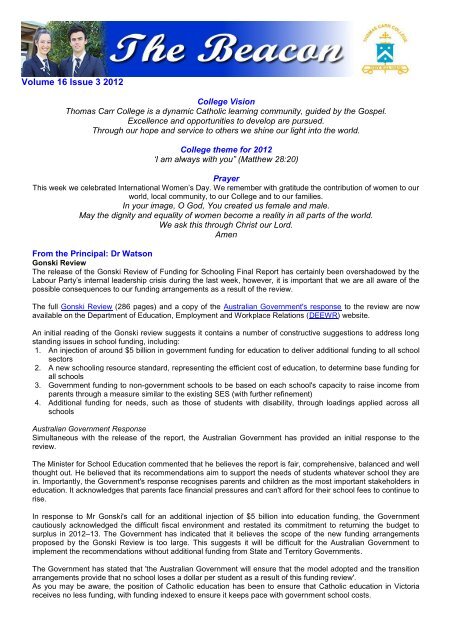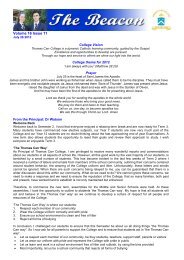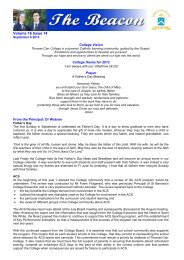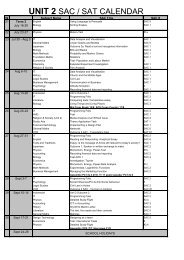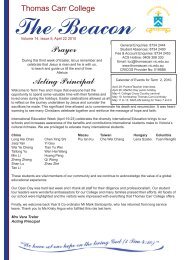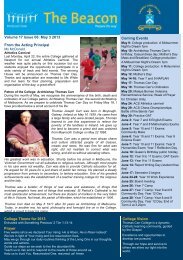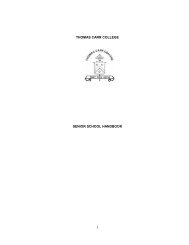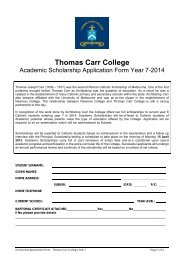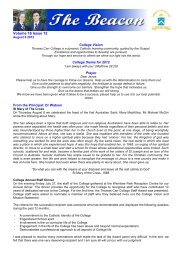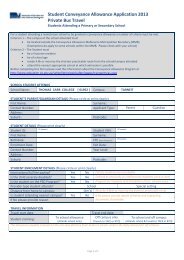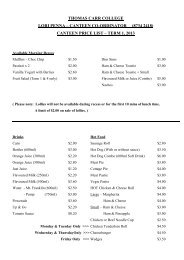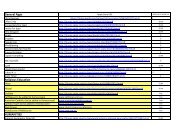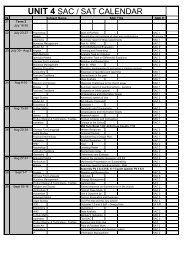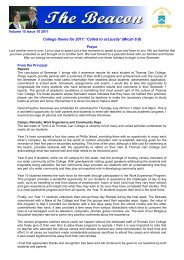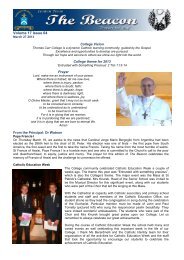Issue 03 - Thomas Carr College
Issue 03 - Thomas Carr College
Issue 03 - Thomas Carr College
Create successful ePaper yourself
Turn your PDF publications into a flip-book with our unique Google optimized e-Paper software.
Volume 16 <strong>Issue</strong> 3 2012<br />
<strong>College</strong> Vision<br />
<strong>Thomas</strong> <strong>Carr</strong> <strong>College</strong> is a dynamic Catholic learning community, guided by the Gospel.<br />
Excellence and opportunities to develop are pursued.<br />
Through our hope and service to others we shine our light into the world.<br />
<strong>College</strong> theme for 2012<br />
‘I am always with you” (Matthew 28:20)<br />
Prayer<br />
This week we celebrated International Women’s Day. We remember with gratitude the contribution of women to our<br />
world, local community, to our <strong>College</strong> and to our families.<br />
In your image, O God, You created us female and male.<br />
May the dignity and equality of women become a reality in all parts of the world.<br />
We ask this through Christ our Lord.<br />
Amen<br />
From the Principal: Dr Watson<br />
Gonski Review<br />
The release of the Gonski Review of Funding for Schooling Final Report has certainly been overshadowed by the<br />
Labour Party’s internal leadership crisis during the last week, however, it is important that we are all aware of the<br />
possible consequences to our funding arrangements as a result of the review.<br />
The full Gonski Review (286 pages) and a copy of the Australian Government's response to the review are now<br />
available on the Department of Education, Employment and Workplace Relations (DEEWR) website.<br />
An initial reading of the Gonski review suggests it contains a number of constructive suggestions to address long<br />
standing issues in school funding, including:<br />
1. An injection of around $5 billion in government funding for education to deliver additional funding to all school<br />
sectors<br />
2. A new schooling resource standard, representing the efficient cost of education, to determine base funding for<br />
all schools<br />
3. Government funding to non-government schools to be based on each school's capacity to raise income from<br />
parents through a measure similar to the existing SES (with further refinement)<br />
4. Additional funding for needs, such as those of students with disability, through loadings applied across all<br />
schools<br />
Australian Government Response<br />
Simultaneous with the release of the report, the Australian Government has provided an initial response to the<br />
review.<br />
The Minister for School Education commented that he believes the report is fair, comprehensive, balanced and well<br />
thought out. He believed that its recommendations aim to support the needs of students whatever school they are<br />
in. Importantly, the Government's response recognises parents and children as the most important stakeholders in<br />
education. It acknowledges that parents face financial pressures and can't afford for their school fees to continue to<br />
rise.<br />
In response to Mr Gonski's call for an additional injection of $5 billion into education funding, the Government<br />
cautiously acknowledged the difficult fiscal environment and restated its commitment to returning the budget to<br />
surplus in 2012–13. The Government has indicated that it believes the scope of the new funding arrangements<br />
proposed by the Gonski Review is too large. This suggests it will be difficult for the Australian Government to<br />
implement the recommendations without additional funding from State and Territory Governments.<br />
The Government has stated that 'the Australian Government will ensure that the model adopted and the transition<br />
arrangements provide that no school loses a dollar per student as a result of this funding review'.<br />
As you may be aware, the position of Catholic education has been to ensure that Catholic education in Victoria<br />
receives no less funding, with funding indexed to ensure it keeps pace with government school costs.
It is not yet clear from the Government's response that a new funding model will accord with this position. The<br />
Government has indicated indexation will be part of any future funding model. The Australian Government will<br />
initiate a consultation process from here to determine the detail of any future funding model.<br />
Preliminary Summary of the Report of the Gonski Review of Funding for Schooling<br />
The Gonski Review report presents a number of recommendations for a future funding model for Australian<br />
schools. The Review's report is detailed and comprehensive. It provides recommendations on what it believes<br />
would constitute a fairer funding system for all students.<br />
The allocation of the additional $5 billion in funds would be determined by three major planks of the Review's<br />
report:<br />
a new schooling resources standard<br />
loadings for indicators of student need, particularly students with disability and special needs<br />
capital funding needs<br />
Schooling Resource Standard<br />
The Review Panel has proposed a schooling resource standard, which aims to determine both the amount of<br />
funding required per student 'to provide a high quality education', and loadings that target disadvantage.<br />
Primarily, the schooling resource standard will identify a base amount of funding for every student, determined from<br />
the actual cost of educating a child in an efficient and high-performing school. Such a school is defined as one<br />
where at least 80 per cent of students are achieving above the minimum standard on NAPLAN testing over the past<br />
three years of results. The report estimates the schooling resource standard for 2009 for both primary and<br />
secondary schools. Under their proposal, the schooling resource standard for primary-level students has been<br />
estimated at $8,000, while secondary is estimated at $10,500.<br />
The government funding a student would attract will reduce according to a measure of the school's capacity to<br />
raise fees. Capacity to pay will be determined by a refined SES model. The initial model proposed would provide 90<br />
per cent of the resource standard to schools in the bottom quartile of SES (less than 90). The initial proposal is to<br />
provide government funding to schools with an SES of 130 at 20–25 per cent of the schooling resource standard.<br />
All Catholic schools will be expected to charge fees under this model. Under this model funding is expected to be<br />
indexed each year in line with the cost of education in efficient, high-performing schools. This proposed change to<br />
indexation should be met with caution by Catholic schools. It breaks the existing indexation link between Catholic<br />
school funding and the actual cost of government schooling.<br />
Loadings for students with disabilities and special needs<br />
The Review Panel suggests that the schooling resource standard should include loadings for:<br />
school size and location<br />
the proportion of Indigenous students and students with low-socioeconomic backgrounds<br />
the proportion of students with a limited English language proficiency.<br />
Precise figures and loadings have not been determined at this stage. This would require additional detailed<br />
modelling. The panel suggests a loading value could be determined when a nationally agreed approach to<br />
identifying disability is determined, and adequate data on the number of students with disability are collected.<br />
Capital funding<br />
The Review panel has called for the establishment of School Planning Authorities in each State and Territory,<br />
made up of representatives from government and non-government sectors. The Authorities would be empowered<br />
to manage planning and development of new schools and major expansions, with funding support provided through<br />
a newly established School Growth Fund.<br />
I have listed overleaf some of the responses from governments and the major education groups in relation to the<br />
Gonski Review:<br />
Catholic Education Office Melbourne (CEOM)<br />
Executive Director, Stephen Elder, reflected the thoughts of many when he said, ‘The government has<br />
recognised that families already face financial pressures in relation to school fees. Catholic education will<br />
analyse the report to ensure it does not put further pressure on Catholic families and the fees they pay. The<br />
final report of the Gonski review has confirmed what many parents know – Victoria has a very good<br />
schooling system and Catholic education plays a very important role. I welcome the government’s<br />
commitment to detailed and extensive consultation on the recommendations of the review. We look forward<br />
to working constructively with the government to test the proposals in the Gonski review. Including fees<br />
from parents, Catholic schools operate on around 90% of the cost of education in a Victorian government<br />
school.’ Parents and teachers would welcome the possibility that students with disability and special needs<br />
would receive the same level of government funding regardless of the school they attend, said Mr Elder.<br />
National Catholic Education Commission (NCEC)
NCEC Chair, Therese Temby, said the release of the report was just the start of the process. ‘This is a<br />
major piece of work and a roadmap for a way forward. There are key questions that remain unanswered.<br />
Substantial analysis needs to be done to test the model and the report’s recommendations. We strongly<br />
back the Gonski panel’s call for an additional $5 billion in funding for all schools.’ Ms Temby called on the<br />
government to show strong leadership and commit to increased funding for schools sooner rather than<br />
later.<br />
Victorian Government<br />
Victorian Education Minister Martin Dixon said there was a need for greater clarity and consultation to<br />
ensure careful consideration was given to any proposed changes to current arrangements and their<br />
‘implications for schools, students and parents’. Mr Dixon also called on the Australian Government to<br />
guarantee that no student or parent would be worse off as a result of the proposed changes. He said it was<br />
pleasing to see the report included several key principles from the Victorian Government submission,<br />
including the entitlement of all students, whatever their family circumstances, to some public funding;<br />
support for parents through the choices they make, not penalising them; and respect for state and territory<br />
governments as the principal providers of school education.<br />
Australian Government<br />
On releasing the review the Australian Government did not endorse all the recommendations, including the<br />
need to boost government funding for schools by at least $5 billion a year. Prime Minister Gillard said, ‘We<br />
think this is a good insight into a new approach to school funding.’ The report suggested that the Australian<br />
Government would bear about 30 per cent of the increase, implying the states would have to find an extra<br />
$3.5 billion. The Prime Minister said it was still the government’s aim to introduce legislation for a new<br />
funding model by the end of the year, after further consultation with the states, schools and the community.<br />
Federal Opposition<br />
Shadow Education spokesman Christopher Pyne accused the Australian Government of continuing a hit<br />
list of non-government schools. He said the Australian Government would drive up private school fees<br />
because it hadn’t committed to continuing indexation for private school funding at present levels. ‘The<br />
independent schools sector stands to lose $4.2 billion in real terms over four years. We will make sure at<br />
the next election that parents and teachers and principals know the Coalition will continue the current<br />
quantum of funding, plus real indexation,’ said Mr Pyne.<br />
Swimming Carnival<br />
It was disappointing that last week’s Swimming Carnival could not go ahead due to the weather conditions. While<br />
the day did eventually clear up, at the time of having to make a decision at 8.00am, the prospect remained that<br />
both students and staff would have spent at least a couple of hours in drizzling rain with little or no shelter on rain<br />
soaked surrounds of the pool; cancellation was the only responsible course of action for the <strong>College</strong> to take. The<br />
<strong>College</strong> will be able to use previous records to select the ACS Swimming Team and the Year 7 students undertook<br />
swimming trails yesterday.<br />
<strong>College</strong> Board<br />
The <strong>College</strong> Board met last week for the first time this year. Mr Goss, Director of Learning and Teaching, presented<br />
to the Board and reports from the Finance Committee and myself were presented. With the AGM coming up in<br />
March, this was the last Ordinary board meeting for a number of representatives.<br />
Therefore, I call for nominations for two positions as Parent Representative on the <strong>College</strong> Board. Parents wishing<br />
to nominate are asked to contact Mrs Deller by 4pm on Tuesday March 13, via email at<br />
kerrie.deller@thomascarr.vic.edu.au Nominees are asked to include a photo and a brief introduction of why they<br />
wish to become a Board member and how they believe they can serve the Board and <strong>College</strong> community. Should<br />
we receive more than two nominations, a vote will be conducted. Parents will receive an email allowing them to<br />
vote electronically. The successful candidates will be announced in the next edition of The Beacon.<br />
Parents and Friends<br />
The first meeting of the Parents and Friends Association will occur on Tuesday March 13 in the <strong>College</strong> Dining<br />
Room commencing at 7.00pm. It would be wonderful to see new parents come along to the meeting and support<br />
the hardworking executive. The Parents and Friends contribute significantly to the <strong>College</strong> and the more help and<br />
support offered, will only make their task easier. I look forward to seeing many new faces next Tuesday evening.<br />
Parent Access Module (PAM) and Parent Teacher Online (PTO)<br />
As outlined at the recent Year 7 Welcome Evening and the Year 8 to 12 Parent Information Night, the <strong>College</strong> has<br />
introduced a Parent Access Module (PAM) which is part of our <strong>College</strong> Intranet (SIMON). PAM enables parents to<br />
access information about their child’s academic progress, as well as information about the various events and<br />
activities held at the <strong>College</strong>. As parents, you will have access to the student daily bulletin, <strong>College</strong> calendar, your<br />
child’s timetable, information about homework and assessment tasks. PAM will also be where you are able to<br />
access your child’s Progress and Semester Reports.
In addition, the <strong>College</strong> will be introducing a new online booking system for Parent/Teacher interviews, Parent<br />
Teacher Online (PTO). The new PTO system is much more user friendly than the previous system. PTO will be<br />
used for the upcoming Parent/Teacher interviews to be held on Thursday March 29 and Friday March 30.<br />
Information will be sent to all parents/guardians about both PAM and PTO, including a unique user name and<br />
password and how to access both PAM and PTO. If you have any difficulties accessing either PTO or PAM please<br />
do not hesitate to contact the <strong>College</strong> via the specified email addresses which will be listed.<br />
From the Deputy Principal: Ms McDonald<br />
Student Leadership<br />
On Friday February 24, the SRC Representatives, Middle School Leaders<br />
and <strong>College</strong> Captains attended the Student Leadership Day. The students<br />
listened to our guest speaker, Rachael Robertson who was the first female to<br />
lead an Australian expedition to the Antarctic. She gave us some wonderful<br />
insights into how she was able to develop her leadership in this very<br />
challenging environment.<br />
The Year 12 SRC reps then facilitated a series of activities which allowed all students to<br />
get to know each other and develop team building skills. Students also spent time in<br />
brainstorming the ‘Raps and Niggles’ list; Raps are the things they love about the<br />
<strong>College</strong> and the Niggles are the things that they don’t like or would like to see changed.<br />
Towards the end of the day, each year level elected their representatives who will make up the SRC Executive<br />
Committee. Congratulations to the following students:<br />
Catharine Mashalidis<br />
Jacob Sigismondi<br />
Breanna Herman<br />
Kyle <strong>Thomas</strong><br />
Aiden Norris<br />
Samoana Petaia<br />
Nelson Decorrado<br />
Cailtin Jerkovic<br />
Adrian Debrincat<br />
Claire Hodgart<br />
Celestina Dyer<br />
Alicia Waring<br />
Lyndon Petrie<br />
Andrew Hennesy<br />
Steven Razlog<br />
Kate Bartels<br />
Holly Briffa<br />
Michael Acciarito<br />
Rebecca Dumesny<br />
Dominic Kumosz<br />
The SRC Executive will meet with me fortnightly to discuss whole school student issues. I am looking forward to<br />
our first meeting on Friday March 9.<br />
COLLEGE AMBASSADORS<br />
On Friday March 2, I met with our new <strong>College</strong> Ambassadors for 2012. I take this opportunity to congratulate<br />
them in their role:<br />
Year 7 Year 9<br />
Patricia Macabeo Silver Samoana Petaia Purple<br />
Natalia Smaza Silver Jake Oorloff Purple<br />
Laruen Shaw Silver<br />
Chelsea Hart Silver Year 10<br />
Kaitlyn Mercieca Jade Ashleigh Barnes Red<br />
Daniel Skinner Jade Stephanie Burgio Green<br />
Esther Tomelty Jade Helena Carapina Jade<br />
Jessica Cassar Green James Farrugia Gold<br />
Natalie Lazarevski White Elyse Haddad Blue<br />
Betty Flyano White Daisy Andrews Blue<br />
Daniela Carapina White Chloe Reeves Purple<br />
Keely Patrick White Bianca Pistone White<br />
Jennifer Setefano Blue<br />
Year 8<br />
Austin Deppeler Green<br />
Vanessa Park Green<br />
Michael Lloyd Gold<br />
Emily Reeves Blue<br />
Alex Oakes Silver<br />
These students will be presented with their badges at the end of term Assembly.
Student Wellbeing<br />
As part of our Annual Action Plan, the <strong>College</strong> is working towards embedding Restorative Practices into the work<br />
we do at the <strong>College</strong>. Restorative Practices help to build capacity in students to enable them to self regulate their<br />
behaviour and they contribute to the improvement of learning outcomes. These practices assist teachers,<br />
students and parents to build, maintain and restore relationships.<br />
To complement this, staff of <strong>Thomas</strong> <strong>Carr</strong> <strong>College</strong> will be involved in a professional learning day with Terry<br />
O’Connell, the Director of Real Justice, on the first day of Term 2. The teaching staff have also begun working<br />
with Jenny Mackay, the Founder and Director of Behaviour Management in Education. Jenny will be working with<br />
the <strong>College</strong> throughout 2012 and the emphasis of her training workshops is teaching student engagement and<br />
management skills. She has a very practical approach to skills training with her focus on the acquisition of<br />
practical and useful behaviour management skills and building collaborative student/teacher relationships.<br />
Visiting the <strong>College</strong><br />
Parents are asked to contact the <strong>College</strong> to request meetings with staff. Arriving at the <strong>College</strong><br />
without having made an appointment may result in parents being disappointed that their queries or<br />
concerns are not dealt with at that time. On arrival at the <strong>College</strong>, please report at the relevant<br />
School Office or Front Office Reception so that the relevant staff member may be contacted on your<br />
behalf. I thank you, in advance, for your co-operation regarding this matter. It is not appropriate for<br />
parents to wander around the <strong>College</strong> looking for staff. Thank you for your support in this matter.<br />
<strong>Thomas</strong> <strong>Carr</strong> Day<br />
<strong>Thomas</strong> <strong>Carr</strong> Day has been moved from September to May 18 this year. After investigating the timing (even<br />
contacting the Foundation Principal of the <strong>College</strong>), the month of September held no significance for Archbishop<br />
<strong>Carr</strong>. It was decided to move the day to May as this is the month that is most relevant to him– it was the month of<br />
his birth, his death and his ordination as a priest.<br />
Planning for this very important day is already underway. A committee of teachers and students are responsible<br />
for ensuring that it is a successful day. Many thanks to the following students who have volunteered to be part of<br />
this committee: Helena Carapina, Chloe Reeves, Katherine Deppeler and Steven Razlog.<br />
We are looking for parent volunteers who would be able to assist with the preparation and cooking of food. If you<br />
are available from 9.00am to 12.00pm on Friday May 18, your support would be much appreciated. Please<br />
contact Mrs Deller to advise of your availability.<br />
The Beacon Awards<br />
The Beacon Awards are awards recognise achievements of our students. Selected students will be presented with<br />
a certificate of commendation and their names will be published in each edition of The Beacon. A maximum of 5<br />
students per year level may be recognised each fortnight. The criteria for these Awards are:<br />
An action performed by a student that supports the Catholic ethos of the <strong>College</strong><br />
Evidence of behaviour which is consistently exemplary or displays great improvement<br />
Active and purposeful involvement in a <strong>College</strong> or community event<br />
Congratulations to the following students:<br />
Year 9 Shaelyn Camilleri, John Santos, Connor Graham<br />
Year 10 Helena Carapina, Stephanie Burgio, Bianca Pistone, Sanchia Duarte, Nicole Johnson,<br />
Ashleigh Barnes<br />
Year 11 Celestina Dyer<br />
Year 12 Daniel Barry, Leticia Cervini, Nicola Pomella, Andre Theron, Francesca Greppi<br />
From the Director of Catholic Identity: Ms Berardinelli<br />
Project Compassion Update<br />
Our Homeroom donations to Caritas Australia’s Project Compassion support long term<br />
partnerships for justice and transformation around the world. This week we meet Khin who is 10<br />
years of age and one of an estimated two million people who have fled poverty, violence and<br />
instability in Burma. Caritas Australia supports a range of programs on the Thai-Burma border for<br />
the communities made vulnerable by displacement, including learning centres offering primary<br />
education for students who cannot attend Thai schools. Khin attends one of six centres Caritas<br />
Australia provides with infrastructure, books, tables, uniforms, textbooks, stationery and lunch for<br />
students.<br />
Over the last two weeks, our Social Justice Co-ordinator, Ms Bradshaw, has been flooded with student interest<br />
and support for the Project Compassion Appeal. She has responded by hosting two expressions of interest<br />
meetings where students have engaged in dialogue about promotion and awareness. There appears to be a real<br />
vibe about this group; great energy and inspiration. A number of our student volunteers were keen to involve<br />
themselves in our first two fundraisers; selling pancakes for Shrove Tuesday and a lunchtime BBQ. In the very<br />
near future, our aim is to establish a more formalised Social Justice structure and leaders at different year levels.
From the Director of Learning and Teaching: Mr Goss<br />
Parent/Teacher Interviews<br />
Parent/Teacher/Student interviews are an essential form of communication between the teacher,<br />
the student and the parents. It is an expectation that the student will accompany<br />
parents/guardians to all interviews. The first term interviews are a great opportunity to meet with<br />
your child’s teachers and to hear of the progress that is being made as well as identifying how<br />
best the partnership between home and school will lead to learning improvements. I am confident<br />
that the interviews will be a positive experience for all and that the effective lines of<br />
communication that are necessary to progress learning, continue to strengthen.<br />
Parent Teacher Online booking<br />
In the next week, you will receive information regarding our Parent Teacher Online (PTO) booking system as well<br />
as the Parent Access Module (PAM) to our intranet system, SIMON. You will be able to access your child’s Term<br />
One Progress Report through PAM as of Tuesday March 20. PTO will then be available to you to make the<br />
necessary teacher bookings via the PTO link from Tuesday March 20 until 4pm on Wednesday March 28. If you<br />
experience difficulty accessing the PTO system, please contact the <strong>College</strong> via the following email address<br />
pto@thomascarr.vic.edu.au Once you have selected the teachers you wish to see, you can print out your own<br />
copy of the interviews and bring this with you on the interview day. We anticipate very few issues regarding the<br />
PTO system and would be interested in your feedback.<br />
Information regarding the location of teachers will be indicated on your booking page, as well as being displayed<br />
at various points around the <strong>College</strong>.<br />
Date Time Location<br />
Thursday March 29<br />
3.50p.m – 5.30p.m.<br />
6.30p.m. – 8.30p.m.<br />
Friday March 30 8.30a.m. – 12.20p.m.<br />
C & D Blocks<br />
End of Term One<br />
A reminder that Term One concludes for students on Thursday March 29 at the normal finishing time of 3.20p.m.<br />
Term One is important in establishing good work habits, study habits and classroom routines and an opportunity<br />
to reflect on whether those habits are making a difference. I trust that our students are making the most of the<br />
opportunities to work with their teachers to develop appropriate strategies to assist them with their learning.<br />
2012 Reporting and Assessment Overview<br />
In 2012, student assessment information will be accessed through the <strong>Thomas</strong> <strong>Carr</strong> <strong>College</strong> Parent Access<br />
Module (PAM). Accessing timely and effective feedback throughout the Semester is important for the families to<br />
identify areas of strength and areas for improvement in a course of study. Below is an overview of how<br />
assessment and reporting will occur in 2012.<br />
Course Assessments and Teacher Feedback<br />
A number of course assessments are performed by students in each course of study throughout the Semester.<br />
By accessing the Student Assessment tab, you will be able to view your child’s assessment details. Each course<br />
assessment will include a description of the task, submission status, the result of the task and the teacher<br />
feedback. Teacher feedback to the student will be in terms of performance, areas for improvement and strategies<br />
to assist the student to continue to make progress in the course.<br />
Assessment Percentage<br />
Each assessment (except VCAL/VET) will have attributed a percentage score indicating your child’s performance<br />
on a particular course assessed piece of work. At the VCE, percentage results for School Assessed Coursework<br />
are not to be interpreted as a result for the subject.<br />
Progress Reports<br />
These will be issued in Terms One and Three and accessed through PAM. The Progress Report will indicate your<br />
child’s work habits and the academic progress in a given subject. The Progress Reports do not contain details of<br />
course assessment, results or teacher feedback. These Reports provide an opportunity for discussion between<br />
parents/guardians, the student and teachers.<br />
Semester Summary Reports<br />
At the conclusion of each Semester, you will be able to access a summary of your child’s assessments completed<br />
throughout the Semester. The summary will indicate the title of the assessments in each course of study and the<br />
percentage results of all course work assessments.
Victorian Essential Learning Standards (VELS) Rating in Years 7 to 10<br />
A VELS rating for each student in Years 7 to 10 is mandated by the State Government. These are not grades or<br />
subject results. The Semester Summary Report will indicate the VELS standard at which your child is performing<br />
in each subject.<br />
The VELS progression point indicated on the Semester Summary Report represents your child’s achievement<br />
level in relation to the expected attainment. It is expected that most students in Years 7 to 10 will be performing<br />
‘at standard’ for their courses of study.<br />
Head of Learning and Teaching (Senior School): Mrs Sabo<br />
Please find below the Year 10 Summative Assessment for Weeks 7 and 8.<br />
Week Subject Summative Assessment Task<br />
7<br />
Studio Arts Conservation and Preservation of Photographs<br />
Assignment.<br />
Wood Health and Safety power point presentation, 5 slides<br />
covering OHS process taught.<br />
Japanese Reading Comprehension Task<br />
Extension Maths Assignment on Expanding and factorising<br />
General Maths (Core) Circle Geometry Chapter Test<br />
Textiles Design Brief and Design Options<br />
Geography Yarra Health Watch Overlay map/Yarra Statistical<br />
Analysis Narmada Dam Folio<br />
IT Network Case Study<br />
Food<br />
Design brief evaluation<br />
Healthy version of a family meal<br />
8<br />
9<br />
Alternate Maths Test on Money management.<br />
Commerce Business Plan<br />
History Social Impact of WW1<br />
Human Movement History of Sport Presentations<br />
RE End of Term Test<br />
Extension Maths VELS Design task: The fire-fighter’s ladder<br />
Environmental Science Prac: Creek Sampling<br />
Japanese Listening Comprehension Task<br />
VCD Folio Task: Descriptive Lettering Assignments<br />
Science Genetics Debate<br />
Music Technical and sight reading exercise and theory test<br />
English ‘The Lord of the Flies’: Creative Writing Task<br />
Indonesian Comprehension Test<br />
Extension Maths Chapter test on Expanding and factorising<br />
Environmental Science Unit Test<br />
PE SEPEP team Season Report & Roles Assignment<br />
Studio Arts Contact Sheet Printing and basic enlargements<br />
Head of Learning and Teaching (Middle School): Mr Carver<br />
Please find below the Middle School Summative Assessment for Weeks 7 and 8.<br />
Year 7<br />
Week Subject Assessment<br />
7 Humanities Unit Test<br />
Technology : Wood Journal / Log book<br />
Japanese Unit 3 Test<br />
8 Indonesian Unit Test : Reading & Writing<br />
English Pankration : Comprehension Test<br />
Civics & Citizenship Group Poster<br />
Humanities Representing Egypt<br />
Religious Education Unit Test<br />
Art Abstract Folio piece<br />
Music Solo Performance 1<br />
Mathematics Problem Solving Unit task<br />
Drama Performance Task 1<br />
Italian Reading/Writing Test Unit 2
Year 8<br />
Week Subject Assessment<br />
7 Indonesian Food : Listening Test<br />
Textiles Cotton Investigation<br />
8 Mathematics Measurement Test<br />
Drama Movement Performance<br />
Religious Education Unit Test : Jesus as a Jew<br />
Indonesian Unit Test : Reading & Writing<br />
Italian Reading/Writing Test Unit 1<br />
Year 9<br />
Week Subject Assessment<br />
7 Guts & Stuff Bones Test<br />
Visual Communication & Designer Profile<br />
Design<br />
Metal ( Technology ) Practical Model<br />
Studio Arts Contact Sheet and related work<br />
Wood ( Technology ) Workbook Evaluation<br />
Food ( Technology ) Marketing powerpoint<br />
8 English Short answer Test<br />
Religious Education Unit Test<br />
Environmental Science Global Warming Poster<br />
Information Technology Presentation<br />
Wood (Technology ) Practical Model Report<br />
Science Light Investigation Task assessment<br />
Metal ( Technology ) Report on Model<br />
From the Head of Learning (English, ESL and LOTE): Ms Sherlock<br />
English at <strong>Thomas</strong> <strong>Carr</strong> <strong>College</strong> is underway with a vast range of topics, texts and events.<br />
Persuasive language in the Year 9 classes has begun with exploration of persuasive language devices. Classes<br />
have worked on their iPads with Apps such as ‘gflash’ to create sets of study cards with definitions, examples and<br />
comments for future study and reflection. Forming an opinion is significant in this Unit of work and students are<br />
encouraged to become familiar with ‘The Age’ App to stay up to date with current news and events. The iPad<br />
hasn’t stopped the traditional writing style though as classes across Year 9 work towards a persuasive essay<br />
writing, complete with a drafting and editing process.<br />
For the Senior School, Unit 3 student essays are taking shape based on the novel ‘Year of Wonders’ by<br />
Geraldine Brooks. This is an engaging text, exploring the basis of the human condition in times of great adversity.<br />
We look forward to some insightful responses.<br />
Students in both Senior and Middle school are encouraged to take full advantage of the Homework Clubs offered<br />
at the <strong>College</strong>. This resource is a powerful learning tool for those who are in the process of drafting responses for<br />
an assessment or SAC task or those who are looking to improve their reading, writing and analytical skills across<br />
all domains.<br />
Upcoming events for English include the ‘Wynspeak’ competition. The competition is calling for 2 Junior (Year 7-<br />
9) and 2 Senior (Year 10-12) public speaking competitors. Winners will receive cash prizes and a trophy from the<br />
organising contributors, Rotary Club Hoppers Crossing and the Hoppers Crossing Apex Club. Any student<br />
interested in applying please contact Ms Sherlock.<br />
From the Head of Senior School: Mrs Knurek<br />
Punctuality<br />
The <strong>College</strong> day commences with Homeroom at 8.45am. Students are expected to arrive at the<br />
<strong>College</strong> by 8.35am so that they are ready for the start of the school day. The pastoral care aspect for<br />
each year level begins in the morning homeroom sessions with a prayer and reflection and is a vital<br />
part of the school day. Your support in facilitating prompt attendance is greatly appreciated.<br />
Year 11 Debutante Balls<br />
A number of Year 11 students have indicated they intend to participate in a Debutante Ball this year. While we<br />
acknowledge the importance of these occasions for students as a “coming of age” and a sign of developing<br />
maturity, we wish to ensure that it does not interrupt their academic pursuits. To be consistent with provisions for<br />
the Year 10 Dance, students are asked to register the date of their own debutante evening with the Year Level<br />
Co-ordinator, Ms Pope. On the specified day, students who bring a note from a parent will be excused at the<br />
beginning of lunchtime (12.45pm). It is the responsibility of the student to advise his/her Period 5 and 6 teachers<br />
prior to the event and to catch up on any missed work.
Shaving and Uniform<br />
Parents are reminded that male students are expected to be clean shaven. A number of males in Year 11 and 12<br />
should shave each morning before coming to school. Parents are asked to familiarise themselves with the<br />
<strong>College</strong> regulations regarding uniform, especially socks and shirts for the boys and jewellery regulations for the<br />
girls. Coloured nail polish is also not permitted.<br />
Peer Support<br />
The Peer Support program assists a range of students within the <strong>College</strong> community and in particular, the Year 7<br />
students in the transition between primary and secondary school, allowing them to feel supported and assisting<br />
them to have a positive start to their secondary schooling. The Year 7 students are encouraged to communicate<br />
appropriately, to listen, show respect and support each other, while the Year 9, 10 and 11 students develop<br />
leadership skills, improve their planning skills and gain a greater understanding and acceptance of others. Peer<br />
Support sessions with Year 7s are held once a week and commenced this week. I congratulate all students<br />
involved and look forward to this enhanced aspect of student leadership contributing to the life of the <strong>College</strong>.<br />
ACS<br />
It is disappointing that students selected to represent the <strong>College</strong> in ACS, have not fulfilled their commitment to<br />
the other members of the team and therefore the <strong>College</strong>, by not attending their allocated sport. This has made it<br />
extremely difficult to get replacements and in some cases, has resulted in teams forfeiting the match. If selected<br />
for an ACS team, students are expected to honour that commitment for the season - usually a period of 6 – 10<br />
weeks. Parents are asked to avoid this time for medical appointments. ACS is a <strong>College</strong> commitment and takes<br />
priority over part time work. Further information about the current ACS program is available from Ms White.<br />
<strong>College</strong> Production - The Importance of Being Earnest<br />
This year the <strong>College</strong> will be generating two productions: a musical in August and the acclaimed play “The<br />
Importance of Being Earnest” by Oscar Wilde from May 3 to 5. These productions involve students from Years 9-<br />
12, and with designs from a professional designer and our own Mr Dalley directing, attendance is a must! Times<br />
and ticket booking information will be available shortly. Please put these dates in your family diary and join us.<br />
From the Middle School: Mr Diamond<br />
Cyber Citizen - How to stay safe in chat<br />
With the roll out of iPads across the <strong>College</strong>, the increase in technology provides our community with<br />
an amazing tool to assist in educating our students, however, these tools can also be a source of<br />
problems in relation to social networking sites and resulting conflict. This technology also brings with it<br />
a responsibility for all to use it appropriately.<br />
To assist parents in supporting their children to be responsible cyber citizens, we have included a few<br />
suggestions below.<br />
Stay in touch with what your children are doing online. While it may become less feasible to actively<br />
supervise their access, continue to discuss internet issues and share internet experiences.<br />
Keep the computer in a public area in the home and ensure that iPads are being charged overnight in these<br />
areas, rather than in the students’ bedroom. It helps to be able to keep an eye on what's going on.<br />
Reinforce the safety messages in cyber rules. Younger teenagers, in particular, should be reminded of the<br />
need to protect their privacy.<br />
Remind teenagers that material posted to blogs can be very, very hard to remove from public view. They<br />
may want to post something now, only to be embarrassed by it later in life!<br />
Ensure teens understand that posting to newsgroups makes their email address public. Have them change<br />
email address if they suspect they are being tracked.<br />
Ensure both you and your teenagers understand laws relating to copyright, privacy, software piracy, hacking<br />
and obscenity.<br />
For children/teens:<br />
Be careful who you trust online and remember that online friends are really strangers. People online, no<br />
matter how long you have been talking to them or how friendly they are, may not be who they say they are.<br />
Meeting someone you have only been in touch with online can be dangerous. If you feel that you “have to‟<br />
meet, then for your own safety, you must tell your parent or carer and take them with you – at least on the<br />
first visit – and meet in a public place in daytime.<br />
Stay in charge in chat rooms. Keep your personal information secret when chatting online (name, address,<br />
telephone number, mobile number, private email address, picture), even if people ask for this. Although it<br />
can be tempting to reveal more than you normally would, giving out these details can make you vulnerable.<br />
Get away from an unpleasant situation in a chat room by logging out (this just takes one click) or by<br />
changing your screen name.<br />
Use a nickname, not your real name, and a nickname that is not going to attract the wrong type of attention.<br />
Tell your parent or carer if someone or something makes you feel uncomfortable or worried.<br />
Learn how to keep/save a copy of the conversations in chat rooms as this may be useful if you want to report<br />
something.<br />
Learn how to block/ignore people. Information sourced from www.cybersmartkids.com.au
.<br />
Bike Safety<br />
Bike helmets became compulsory in Victoria on July 1 1990. By law, Victorians must wear a helmet<br />
that has been approved to Australian Standards. This law applies on roads, bike paths, bike lanes,<br />
shared and segregated footways and in other public places such as recreational parks and car<br />
parks. We encourage all parents to support this law and <strong>Thomas</strong> <strong>Carr</strong> <strong>College</strong>.<br />
From the Director of Student Services: Mrs McCarthy<br />
Harmful drug and alcohol use by young people continues to be a significant concern for most<br />
parents and school staff. Many young people are able to make a smooth transition from childhood<br />
and adolescence through to adulthood, however, others struggle and find themselves engaging in<br />
risky behaviours such as excessive alcohol consumption.<br />
As parents of teenagers, you may be aware over the past few years that the Australian Drug Foundation has<br />
been lobbying for federal legislation to prohibit the provision of alcohol to children on private property without<br />
parental permission. The call for the drinking age to be raised has come out of growing evidence of the<br />
vulnerability of the brains of young adults to damage from alcohol ingestion.<br />
The harmful health and other effects of excessive alcohol consumption, particularly among young people have<br />
long been of concern. Current statistics are alarming; 70 young people are admitted to hospital each week and 4<br />
die because of alcohol abuse. Children as young as 12 are seeking help for alcohol abuse as recent figures from<br />
a major Melbourne drug treatment centre reveal a sixfold increase in cases of young people with drinking<br />
problems.<br />
On November 1 2011, the law changed to make it illegal to serve alcohol in a private home to anyone under 18,<br />
unless their parents have given permission. Adults who break the new law face fines over $7000 which is the<br />
same amount a licensee would be fined for selling alcohol to someone who is underage. More information is<br />
available at www.teendrinkinglaw.vic.gov.au<br />
Research has shown that it is possible to reduce the risks of harmful drug and alcohol use by building up certain<br />
protective factors in young people. Young people are more likely to resist harmful drug use if they:<br />
feel a sense of belonging and fitting in at school<br />
experience positive experiences and achievements at school<br />
have someone outside the family who believes in them<br />
have opportunities to be an active contributor in their school and community<br />
feel loved and respected<br />
have a religious or spiritual connectedness<br />
Together families, schools and communities can reduce the risks and increase these protective factors in young<br />
people. By working together, we are able to prevent harmful drug use and to improve the wellbeing of all<br />
members of our community. If you would like to learn more about how to talk to your children about underage<br />
drinking, and to see what influence you have on when, what and how much your child drinks, then please visit the<br />
above website or contact one of the <strong>College</strong> counsellors.<br />
From the Careers Co-ordinator: Mrs Williams<br />
We are nearing the completion of our Year 12 careers interviews and will be commencing our interviews with the<br />
Year 10 students in Week 7.<br />
The current edition of the <strong>Thomas</strong> <strong>Carr</strong> Career News is available online in the Student Services area of our<br />
website. This newsletter will be available across the course of the year and will be a wealth of information for both<br />
students and parents. Information is accurate, up to date and timely for our Senior School students.<br />
A reminder to all Year 10 students that they should be sourcing and securing a placement for the Year 10 Work<br />
Experience which runs in Term 2 from Monday June 25 through until Friday June 29.<br />
From the <strong>College</strong> Nurse: Mr Stanley<br />
Head Lice<br />
While children are at school, many families will come in contact with head lice. At any given time, it<br />
is estimated that 2-3% of Victorian school children may have head lice.<br />
Head lice are small, wingless, blood sucking insects. Their colour varies from whitish/brown to<br />
reddish/brown. Head lice only survive on humans and when isolated from the head they die very quickly.<br />
People get head lice by direct hair to hair contact with another person who has head lice. This can happen when<br />
people play, cuddle or work closely together. Head lice do not have wings or jumping legs so they cannot fly or<br />
jump from head to head, they can only crawl.
Treating head lice involves removing lice and eggs from the hair. This can be done by:<br />
a) Buying and using a head lice shampoo and following the instructions on the product<br />
b) Using the ‘condition and comb method’ every second day until there have been no live lice found for 10 days<br />
Further information on head lice and the above treatments can be found at www.health.vic.gov.au/headlice<br />
While head lice are not considered an agent for infectious disease, they are included on the school exclusion<br />
table which is issued by the Department of Human Services. The table states the exclusion criteria as “a child<br />
must be excluded from school until the day after appropriate treatment has been commenced”.<br />
If you know that your child has a case of head lice, please report it to the <strong>College</strong> Nurse on 8734 2413 or the<br />
relevant Year Level Co-ordinator.<br />
Cinnamon Challenge<br />
The <strong>College</strong> has been made aware of a popular new dare which has been mentioned by students at school<br />
recently. It is called the Cinnamon Challenge. It is used as a dare or competition in which a person attempts to eat<br />
or swallow a spoonful of ground cinnamon without drinking anything. This, of course, is very difficult because the<br />
cinnamon quickly dries out the mouth, making swallowing difficult.<br />
The challenge has been around for several decades, increasing in popularity in 2007 with the availability of social<br />
networking and YouTube. Since the spice is highly absorbent, the result usually entails gasping for air, coughing<br />
spells, and in some cases, vomiting. As cinnamon absorbs saliva, it can make it difficult or impossible for a<br />
person to swallow, resulting in breathing issues or other physical reactions. Attempting to swallow cinnamon can<br />
be especially dangerous for students with asthma.<br />
Parents are encouraged to speak with their children about this dangerous practice and warn them of the serious<br />
health risks of engaging in such behaviour.<br />
From the Student Wellbeing Co-ordinator: Mrs Janicki<br />
Many staff at the <strong>College</strong> have noticed an increase in the number of students coming to school this<br />
term complaining of lack of sleep and feeling tired. Adolescents need between 9 and 10 hours of<br />
sleep each night, yet most only get 7 or 8 hours, some get even less. Regularly not getting enough<br />
sleep can affect a teenager’s academic performance and may increase the risk of emotional<br />
problems such as depression.<br />
Causes of sleep deprivation<br />
Some of the reasons why many teenagers regularly do not get enough sleep include:<br />
Hectic after school schedule including sport, homework, social commitments and part time work<br />
Leisure activities such as television, social networking and PlayStation/computer games can keep a teenager<br />
out of bed<br />
Light exposure cues the brain to stay awake. In the evening, light from the television, iPads and mobile<br />
phones can prevent adequate production of melatonin, the brain chemical responsible for sleep<br />
Insufficient sleep causes a teenage brain to become more active and an over aroused brain is less able to<br />
fall asleep<br />
Effects of sleep deprivation<br />
The effects on chronic (ongoing) sleep deprivation may include:<br />
Difficulty concentrating<br />
Moodiness/aggression<br />
Mentally ‘drifting off’ in class<br />
Depression<br />
Shortened attention span<br />
Reduced academic performance<br />
Memory difficulties<br />
Reduced sporting performance<br />
Poor decision making<br />
Preventing sleep deprivation - tips for parents<br />
Try not to argue with your teenager about bedtime. Instead, discuss the issue with them. Together, brainstorm<br />
ways to increase their nightly quota of sleep. Suggestions include:<br />
Allow your child to sleep in on the weekends<br />
Encourage an early night every Sunday. A late Sunday night followed by an early Monday morning will make<br />
your child tired for the beginning of the school week.<br />
Decide together on appropriate time limits for any stimulating activity such as homework, television or<br />
computer games. Encourage restful activities during the evening, such as reading.<br />
Avoid early morning appointments/training sessions for your child where possible<br />
Help your child better manage their after school schedule and see if they are over committed<br />
Encourage your child to have a nap after school to recharge their batteries, if they have time
Preventing sleep deprivation - tips for teenagers<br />
The typical teenage brain wants to go to bed late and sleep late the following morning, which is usually hard to<br />
manage. You may be able to adjust your body clock but it takes time. Suggestions include:<br />
Choose a relaxing bed time routine; eg have a hot bath/ shower before bed<br />
Avoid computer games, loud music, homework or any other activity that gets your mind racing for about an<br />
hour before bed<br />
Keep your room dark at night and try to avoid watching television right before going to bed<br />
Avoid staying up too late on weekends<br />
Remember that even 30 minutes of extra sleep each night on a regular basis makes a big difference,<br />
however, it may take about six weeks of getting extra sleep before you feel the benefits.<br />
You can get help from your GP and/or the Student Wellbeing Department at the <strong>College</strong>. For more information<br />
regarding ‘Teenagers and Sleep’ visit www.betterhealth.vic.gov.au<br />
From the Student Support Co-ordinator: Mrs Borg<br />
Assisting your children with their homework can often prove difficult due to different ways which we were taught<br />
when we went to school. Many ways of calculating problems are even taught differently and it can be quite<br />
difficult for parents wishing to help their children.<br />
A valuable resource promoted to parents when in meetings in the Student Support Department is the use of<br />
YouTube. Simply enter the topic your child is struggling with and a variety of online tutorials are at your fingertips.<br />
This is especially helpful in the area of Maths. For example, if you type in long division you will immediately have<br />
access, explanations and examples in an audio and visual form.<br />
This can help in many subject areas and the students will never know that you might be lost for<br />
answers. For further ideas about assisting your child with homework feel free to call me.<br />
From the Home Liaison Co-ordinator: Sr Lorraine<br />
I take this opportunity to thank all who have welcomed me to the <strong>College</strong> and responded to my<br />
invitation to allow me to make a home visit. I am slowly working through the list of responses and hope<br />
to have most Year 7 home visits completed before the end of Term 1.<br />
As I visit families, the first question that is asked is “What exactly is your job?” To be honest, my role is not that<br />
easily explained as it changes according to the needs of those who wish to access my services. The starting point<br />
for me is always making initial contact with families, then offering time to talk, to support, to help families network<br />
with other families and/or support services within or outside of the <strong>College</strong>.<br />
I am fortunate to be part of the Student Services Department and, as such, work closely with the Department to<br />
ensure that the whole family – parents/carers and students are cared for. In the end, it is my role to ensure that<br />
the question ‘How are you, the parent/carer’ coping with the highs and lows of secondary School life.<br />
From the Director of International Programs: Dr O’Connor<br />
Lianyungang Foreign Language School Visit<br />
<strong>Thomas</strong> <strong>Carr</strong> <strong>College</strong> recently hosted 27 students from our partner school in Lianyungang. They will be<br />
undertaking VCE in 2013 and this visit gave them an opportunity to see what Victorian education is all about.<br />
The Chinese students spent the day on a walking tour of the Melbourne City Centre. This included the bridge over<br />
the Yarra, dedicated to all the various migrant groups who have come to Australia, along with Federation Square,<br />
the University of Melbourne and Chinatown.<br />
The following three days were spent at <strong>Thomas</strong> <strong>Carr</strong> <strong>College</strong>. The Lianyungang students were partnered with our<br />
Year 10 students and attended class with them. It was an eye opening experience for the Chinese who also<br />
attended special Physics and Chemistry practical experiments in our Science laboratories.<br />
By the end of the visit, some firm friendships were made and students from our <strong>College</strong> recognised that they had<br />
a lot in common with their Chinese counterparts. The great thing about this program is that it allows students from<br />
the two different cultures to engage with each other as well as learning to understand the international stage of<br />
which they are all a part of.<br />
My Trip to Japan: Katherine Deppeler<br />
In the summer holidays, I was very fortunate to have gone to Tokyo, Japan. As it was winter in Japan, it was a<br />
beautiful experience seeing heavy snow, going to Disneyland and Disney Sea and shopping in famous towns like<br />
Harajuku and Shibuya. Japan is also a country of rich culture. I went to visit temples to pray and participated in a<br />
tea ceremony dressed in a traditional winter kimono.
One thing I didn’t understand was how the Japanese girls in winter wore short shorts and<br />
knee high socks, the number one fashion trend in Japan! Japanese school is also very<br />
different. There are 35-40 students per class. They also have two uniforms; one for senior<br />
high and one for junior high.<br />
I was also very fortunate to have met my friends who came to Australia and stayed with<br />
me. After the earthquake on March 11 last year, I was very relieved to meet them. Kanae<br />
was telling me that 10 years ago, her school had a major redevelopment to protect from<br />
events like this. On the day of the earthquake, students who had club activities, had to stay<br />
and sleep at the school. Shiori, who came to Australia in 2010, told me that there was no<br />
damage to her parents house, but the power had gone out and it was horrible.<br />
I would like to thank Ms Shaw for helping with the organisation of my trip, Kanae Yukawa<br />
from Sakuragaoka Junior and Senior high school, my four host families and my mum for<br />
helping pay for this trip. Without you all, this trip wouldn’t have been such a success.<br />
2012 US Taekwondo Open Championships: Carla De Pasquale<br />
What a huge success and wonderful experience for me and all the City West Taekwondo players. Competing in<br />
Taekwondo’s largest international ‘open’ tournament in the world was very tough going for the Australian<br />
Taekwondo Team with most players eliminated in their first round of competition across both disciplines -<br />
Sparring and Poomsae.<br />
I competed in Poomsae. I qualified for finals in all three of my events. In the end, I won<br />
Australia’s only Gold Medal in my Teams Event (1 st out of 13 countries) and a Bronze Medal in<br />
my individual event (3 rd out of 71 international representatives). I also competed in Mixed<br />
Pairs, finishing 8 th out of 39 pairs.<br />
A special word of thanks to Dr Watson and the entire <strong>Thomas</strong> <strong>Carr</strong> <strong>College</strong> community for<br />
your ongoing support and encouragement. This is my third year at the <strong>College</strong> and the school<br />
environment is a positive influence and contributes to my successes.<br />
Uniform Shop News<br />
Avoid the waiting and rushing – start organising winter uniform now. Due to changes with the Education Tax<br />
Refund; please keep all receipts for your 2011/2012 taxation claims.<br />
Open Monday, Wednesday and Friday 8:15am – 4:00pm. Phone Karen on 9749 5969.<br />
Community News<br />
Werribee Indoor Sports Centre<br />
Form a team with your friends and mates and come and join the action. Soccer, Netball, Cricket available. We also<br />
cater for sports birthday parties. 13 Riverside Avenue, Werribee. Visit www.werribeeindoorsports.com.au or ring<br />
9741 5122.<br />
Youth Symposium by 21 st Century Education: Thursday April 26<br />
A fun, entertaining and interactive one day ‘life skills workshop’ proven to education and motivate teenagers about<br />
self esteem, confidence, respect, attitude and managing money. Visit www.youthsummit.com.au to book a place.<br />
Woodville Basketball Club<br />
Boys and girls are invited to play basketball in 2012 starting April. Sign up now and receive a special introductory<br />
fee of $100, a 40% saving. Register at www.woodvillebc.com.au/season.html or ring Mark 0433 977<strong>03</strong>4, Troy 0401<br />
057097 or Janice 0425 759714.<br />
Victorian School of Languages<br />
The VSL is now enrolling students for 2012 classes. This is a Government School which<br />
specialises in teaching languages. Every language studied through the VCE level earns bonus<br />
marks for entry into University Courses. In the Werribee area, the School runs out of Galvin<br />
Park <strong>College</strong>. To enrol online or find out further information visit www.vsl.vic.edu.au<br />
Altona Junior Football Club<br />
We currently are looking for players to fill positions available in our U16 team. Our goal is not to purely<br />
win games of football each week but to develop young boys into young men through leadership on<br />
and off the football field. We also encourage mateship and fitness and that every player should get a<br />
fair go. Please contact Ashley Dumesny 0400 545 820 or email adumesny@aae.com.au
Coming Events<br />
Mar 9: Middle School photo day<br />
Mar 12: Labour Day public holiday (<strong>College</strong> closed)<br />
Mar 13-16: Catholic Education Week<br />
Mar 15: St Patrick’s School Mass, ACS Swimming carnival<br />
Mar 21: Year 7 2013 parent/student interviews<br />
Mar 22: Year 7 2013 parent/student interviews<br />
Mar 27: Return of ACS summer tops by Years 7 & 8, Board meeting<br />
Mar 29: End of Term 1 (3.20pm), Parent/Teacher interviews (3.50-8.30pm)<br />
Mar 30: Parent/Teacher interviews (8.30am – 12.30pm)<br />
Apr 16: Term 2 begins (student free day)<br />
Apr 17: Term 2 classes resume for students<br />
Easter Liturgies at our Local Parishes<br />
St James the Apostle Parish<br />
Thursday March 29 7:30pm Combined St James and St Peters 2 nd Rite of Reconciliation<br />
Liturgy followed by individual confession at St Peters, 38 Guinane Ave,<br />
Hoppers Crossing)<br />
Saturday March 31 6:00pm Palm/Passion Sunday Vigil Mass<br />
Sunday April 1 8:30am<br />
10:30am<br />
5:00pm<br />
Tuesday April 3 7:00pm 1st Rite of Reconciliation<br />
Thursday April 5<br />
Holy Thursday<br />
Friday April 6<br />
Good Friday<br />
Saturday April 7<br />
Easter Saturday<br />
Sunday April 8<br />
Easter Sunday<br />
Palm/Passion Sunday Masses<br />
The 10:30am Mass starts in the Play Plaza for the blessing of the Palms<br />
7:30pm Mass of the Lord’s Supper and Washing of the Feet<br />
No 9:00am Mass this day<br />
10:00am<br />
3:00pm<br />
7:30pm Easter Vigil<br />
6:00am<br />
7:30am<br />
9:00am<br />
10:30am<br />
5:00pm<br />
St Peter Apostle Mission Parish<br />
Thursday April 5<br />
Holy Thursday<br />
Friday April 6<br />
Good Friday<br />
Saturday April 7<br />
Easter Saturday<br />
Sunday April 8<br />
Easter Sunday<br />
Stations of the Cross at St James Church and Grounds prepared by the St<br />
James Youth Ministry<br />
Solemn Liturgy of the Lord’s Passion at St James Church<br />
Dawn Mass followed by Breakfast in the Hall following Mass<br />
Mass<br />
Mass<br />
Mass<br />
Mass<br />
7:30pm Mass of the Lord’s Supper<br />
10:00am<br />
3:00pm<br />
10.00am<br />
8.00pm<br />
7.45am<br />
9:00am<br />
10:30am<br />
Stations of the Cross<br />
Celebration of the Lord’s Passion followed by Divine Mercy Novena<br />
Divine Mercy Novena<br />
Easter Vigil Mass<br />
Easter Sunday Masses<br />
Divine Mercy Novena following 10.30am Mass<br />
No 5.00pm Mass


